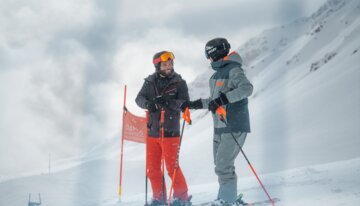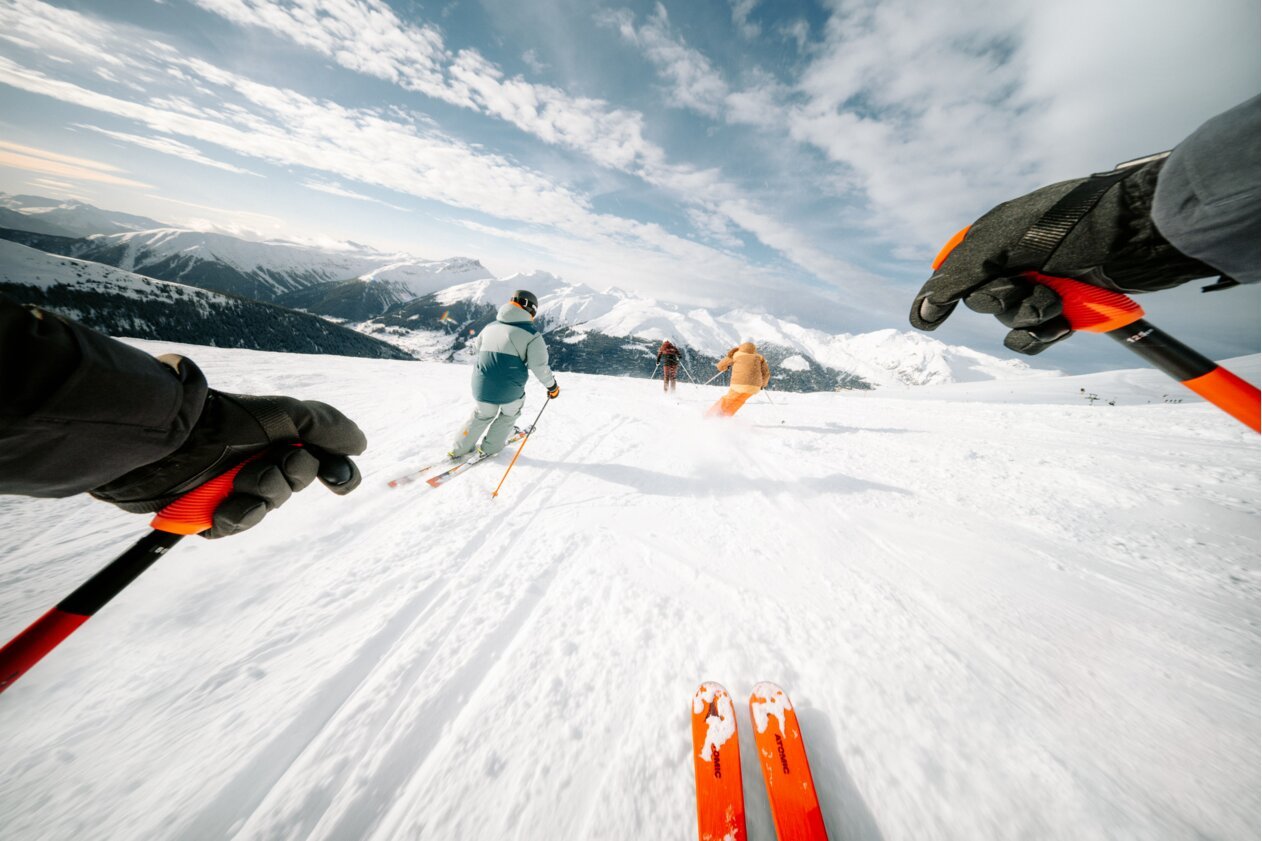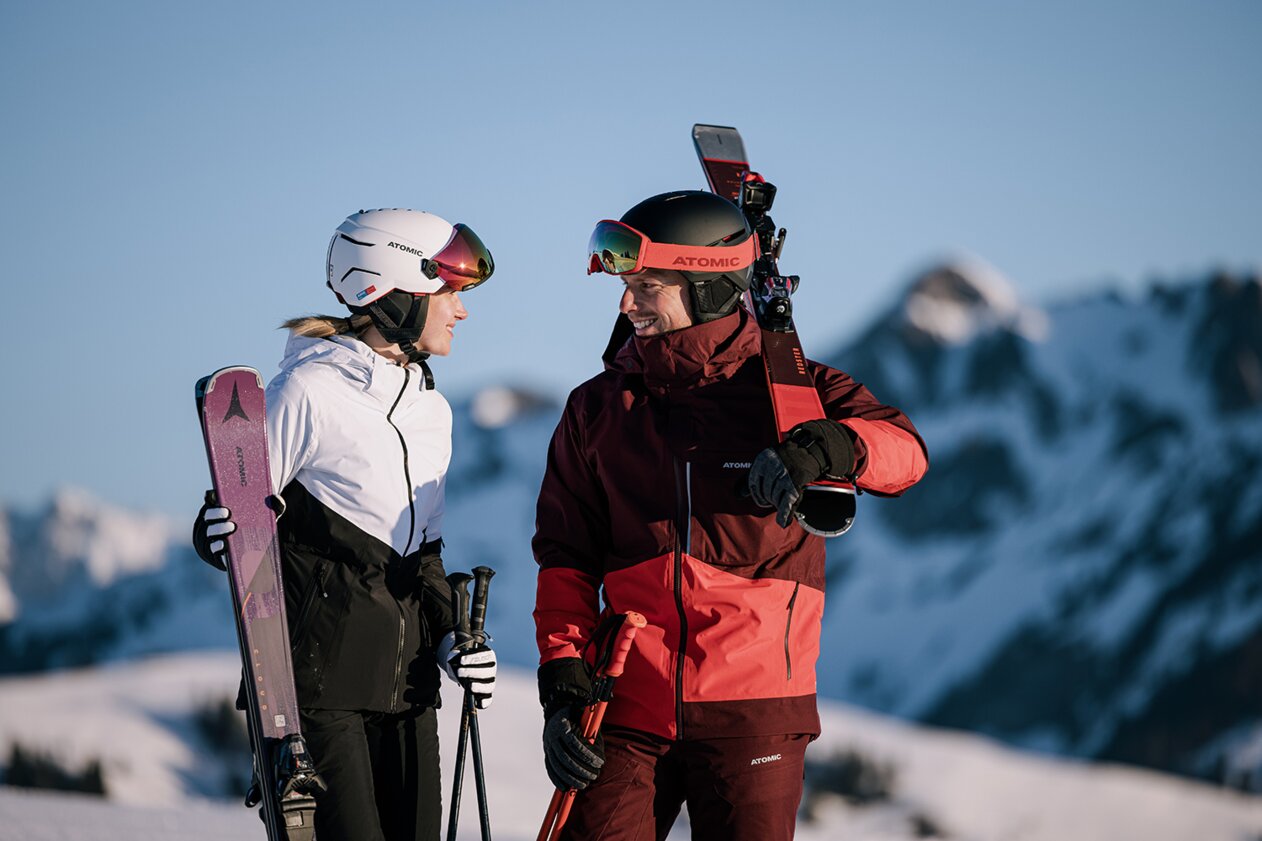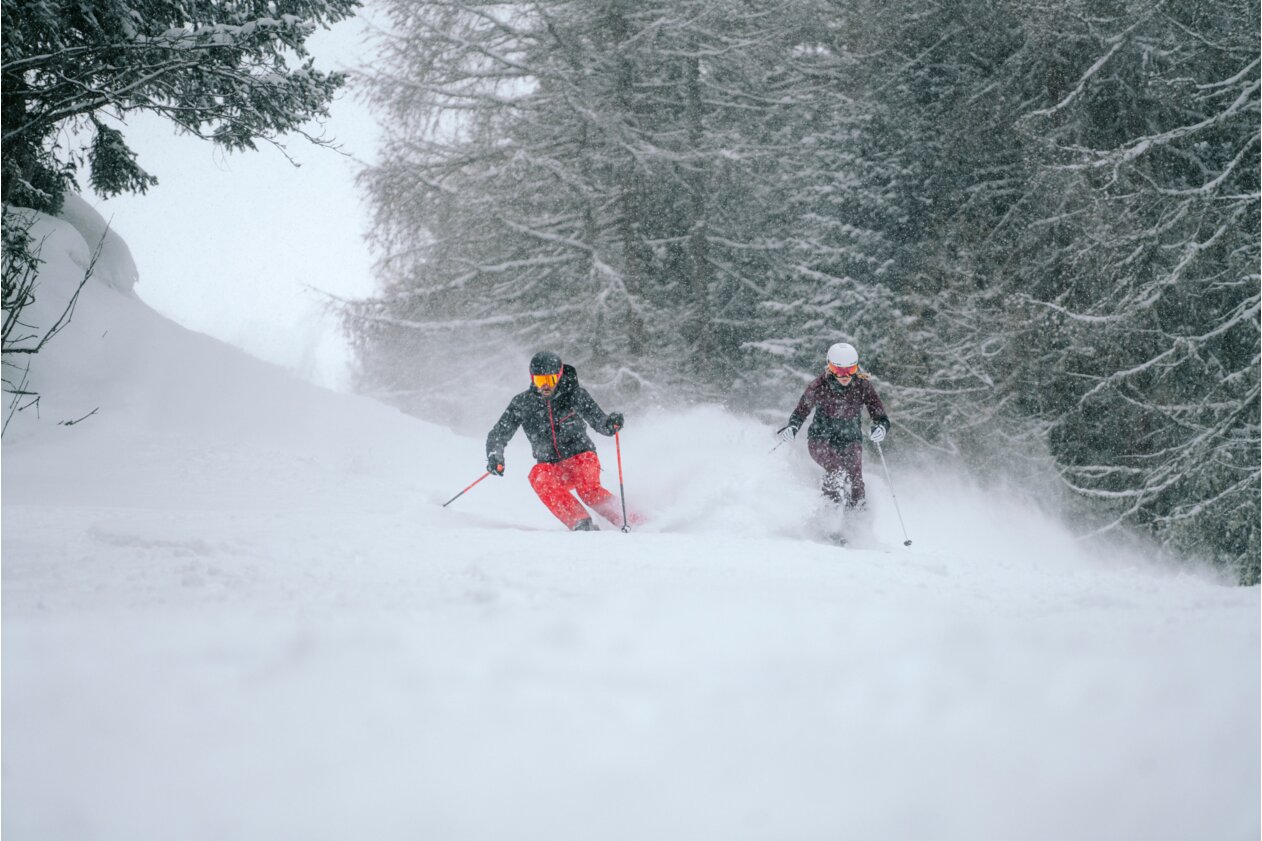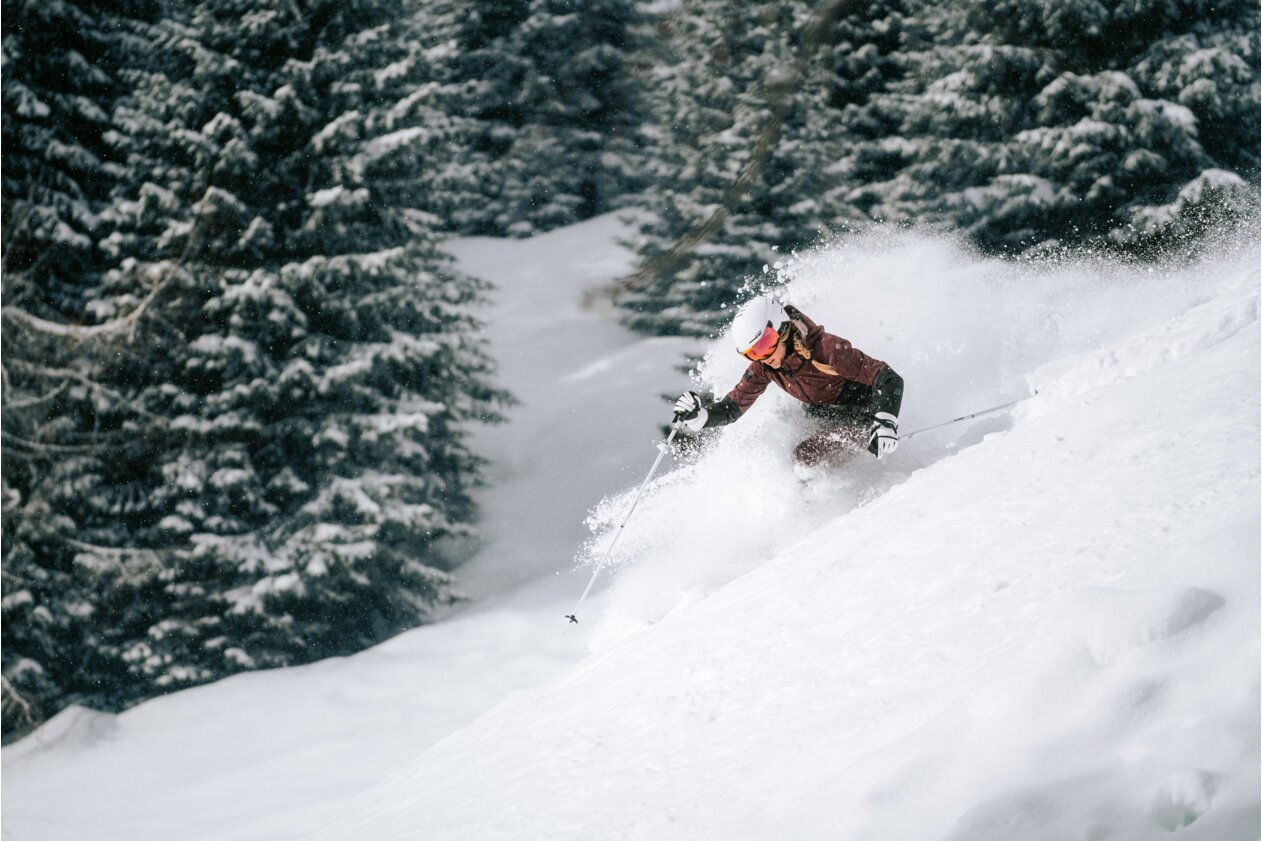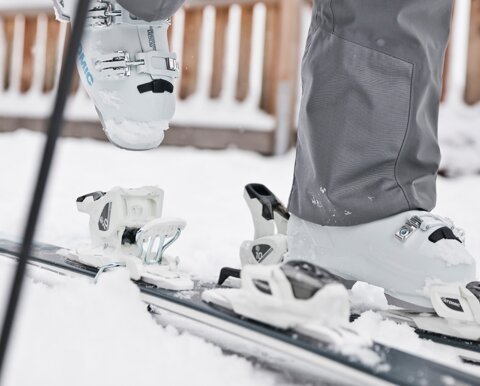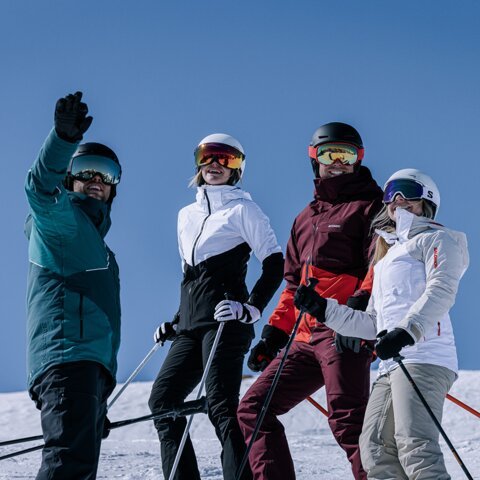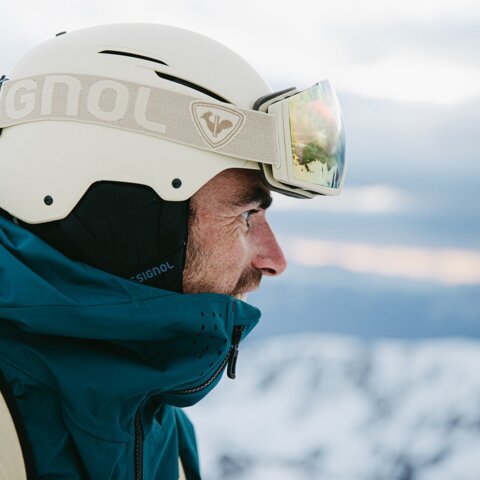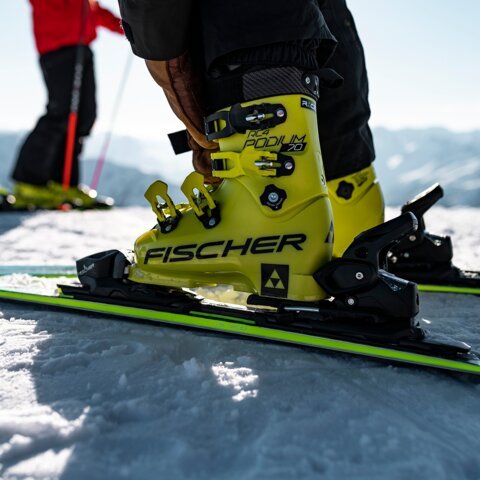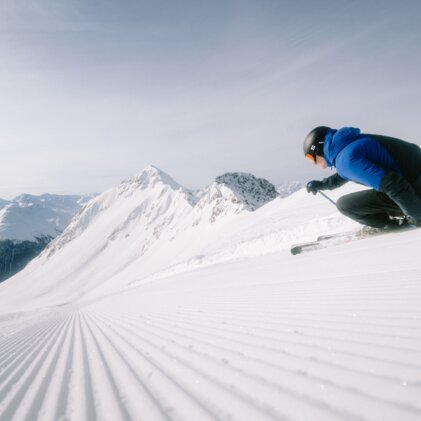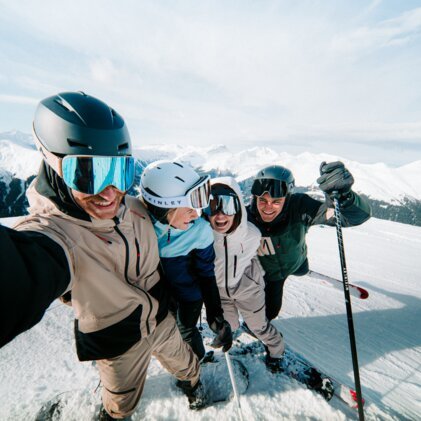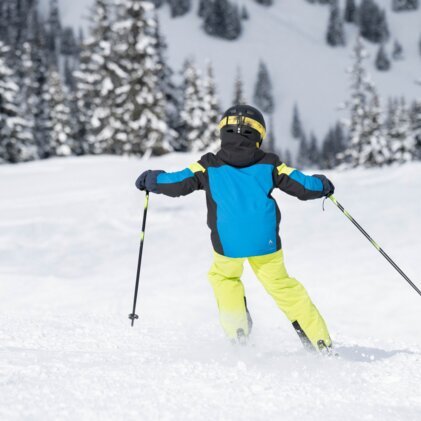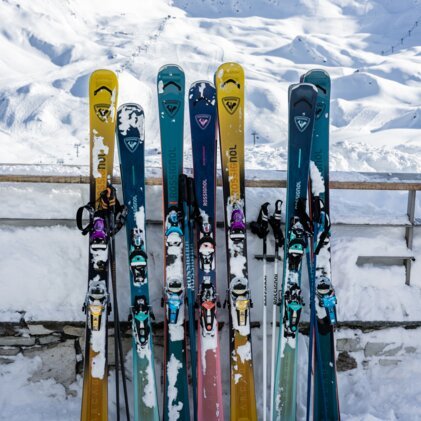Whether groomed slopes or freeride in untouched terrains – your ski for every adventure
If you are looking for a flexible, adaptable ski for your next skiing adventure, the all-mountain ski is just the right thing for you. This all-round ski offers a perfect balance of stability and flexibility that is ideal for all snow conditions and types of terrain. Whether you are a beginner or an experienced skier, an all-mountain ski gives you the freedom to master every slope or hillside – from groomed runs to untouched powder snow.
With our best tips and the opportunity to test different models directly, we want to make selecting the perfect one as easy as possible for you. Whether you’re interested in ladies all mountain skis or models for men, INTERSPORT Rent offers you the possibility to try as many all-mountain skis as you want. And all of this in some of the world’s most breathtaking ski resorts at unbeatable conditions and at over 800 locations.
Take the opportunity to expand your knowledge of all-mountain skis or contact our RENTertainers – our experienced local experts for winter sports. They will be happy to give you personalized advice!
What is an all-mountain ski?
An all-mountain ski is a real all-rounder among the types of skis. In contrast to skis designed only for groomed trails or deep powder, all-mountain models are crafted to offer you excellent performance on different terrains. The unique construction of this skis allows versatile skiing on any trails. Whether you love the thrill of fast runs on groomed slopes or you are looking for the challenge of untouched powder, their construction ensures you maintain stability and control in tight and wide turns. That ensures a fantastic skiing experience, even in changing snow conditions.
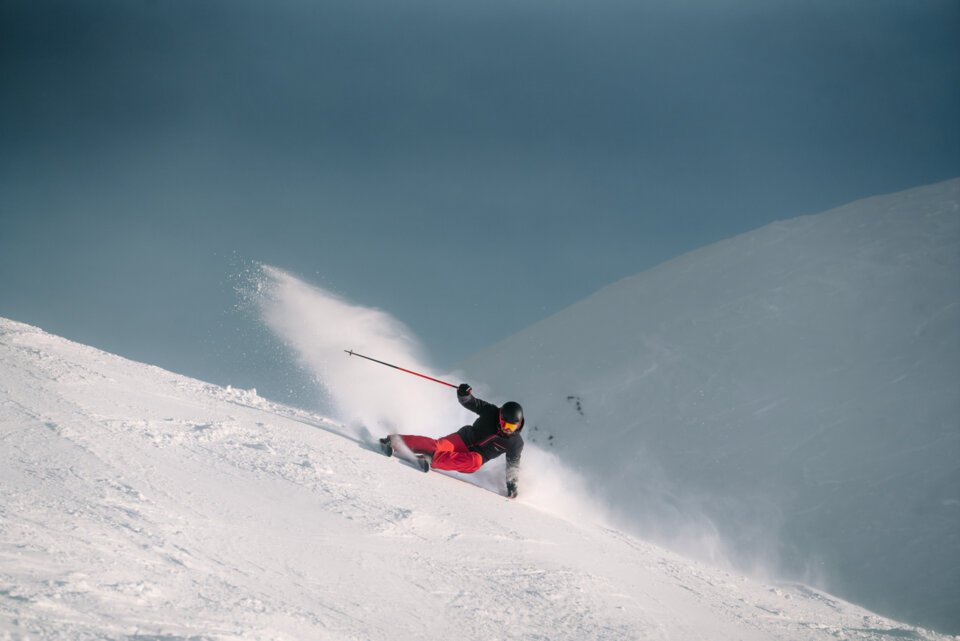
Benefits of all-mountain-skis
All-mountain skis offer a range of benefits, making them popular with both beginners and professionals:
- Versatility: These all-round skis allow you to handle a variety of terrains and snow conditions – from groomed snow to deep powder snow.
- Stability: Their special construction offers a high level of stability to all-mountain skis. This is particularly beneficial on hard slopes.
- Flexibility: The design allows tight curves and wide turns on the slopes while ensuring good control in more open terrain.
- Suitable for all Skill Levels: Whether you are a beginner or advanced skier – all-mountain skis offer models for every skiing style and experience level.
Thanks to this versatility, all-mountain skis are particularly suitable for skiers who are looking for variety and adventure.
Choosing the right all-mountain ski for your needs
Selecting the right model is key to maximizing your skiing experience. The perfect all-mountain ski matches your skiing style, body size and experience level. To ensure you choose the ideal model, here are the main factors to consider:
- Body size and weight: The length and width of the ski should match your body weight and height to ensure optimal balance and control.
- Skiing style: Consider where and how you intend to ski most frequently. Although all-mountain skis are versatile across terrains, slight differences between models can support specific styles.
- Experience level: From beginner to expert, there are models suited to different skill levels. Shorter, lighter skis are easier to maneuver for beginners, while advanced skiers may prefer longer, more stable skis.
- Personal preferences: Ultimately, the best ski choice depends on your individual preferences. Testing different models can help you find the ski that feels best.
Our tip: INTERSPORT Rent allows you to try the latest models for both men and women at attractive rental prices before committing to your ideal ski. Get personalized advice at over 800 locations in the world’s most beautiful ski resorts. Our winter sports experts – the RENTertainers – are eager to help you make the right selection.
Technical properties and features of all-mountain skis that impress
All-mountain skis are characterized by numerous technical features specifically designed to deliver optimal performance across varying terrains. Here are some of the key attributes:
Constructions and materials
All-mountain skis are often made from high-quality materials like carbon or fiberglass, offering an ideal balance between weight and stability. The mix of these materials ensures a durable yet lightweight construction, which supports easier handling in different snow conditions.
Length
Shorter all-mountain skis are generally more maneuverable and easier to control, making them popular among beginners. A ski length that reaches about eye level is recommended.
Experienced skiers often prefer longer skis, as they offer greater stability at higher speeds. They are easier to control at a larger curve radius, even if more effort is required. For these skiers, a ski length around their height or even longer may be ideal.
Tip: Optimal ski length is highly individual, determined by body height, weight and skiing style.
Weight
The weight of all-mountain skis depends on the materials they are made of. The core, often made of lightweight wood, forms the bulk of the ski, while metal components, like edges and reinforcements, provide additional stability. While heavier skis offer more stability, lighter models are easier to maneuver.
Powder-tip: In deep snow, a low weight and broader waist width enhance floatation
Waist width
The waist width, or sidecut, affects how the ski handles turn. A greater sidecut allows for tighter turns, while a flatter, wider ski favors broad, sweeping arcs. All-mountain skis typically have a waist width between 65 and 110 mm.
Tip: For occasional powder runs, you should choose a narrower all-mountain ski. For avid off-piste enthusiasts, a wider model will be more suitable.
Rocker and camber profile
A ski’s profile describes its shape and curvature, influencing how it contacts the snow. This profile affects stability, agility, and floatation on various snow types. All-mountain skis have a rocker- or camber-profile:
Rocker
The rocker profile is the dominant profile in all-mountain skis. The ends are slightly curved and the middle section with the ski binding touches the ground. This design enhances agility and floatation in deep snow.
Camber
Camber models offer grip and stability on hard-packed surfaces. Here, the ski tips and tails serve as contact points. The binding area only comes into contact with the ground and edge when there is a load.
Dampening technology, edges and radius
Advanced damping technology ensures that vibrations and shocks are absorbed while driving. This not only increases comfort but also enables a safer driving experience, especially on uneven surfaces or at higher speeds.
The edges of an all-mountain ski are usually reinforced to provide good grip even on hard, icy slopes. The radius - which determines the turning characteristics - is often between 14 and 18 meters for all-mountain skis. A smaller radius allows for tighter turns, while a larger radius is ideal for wide turns.
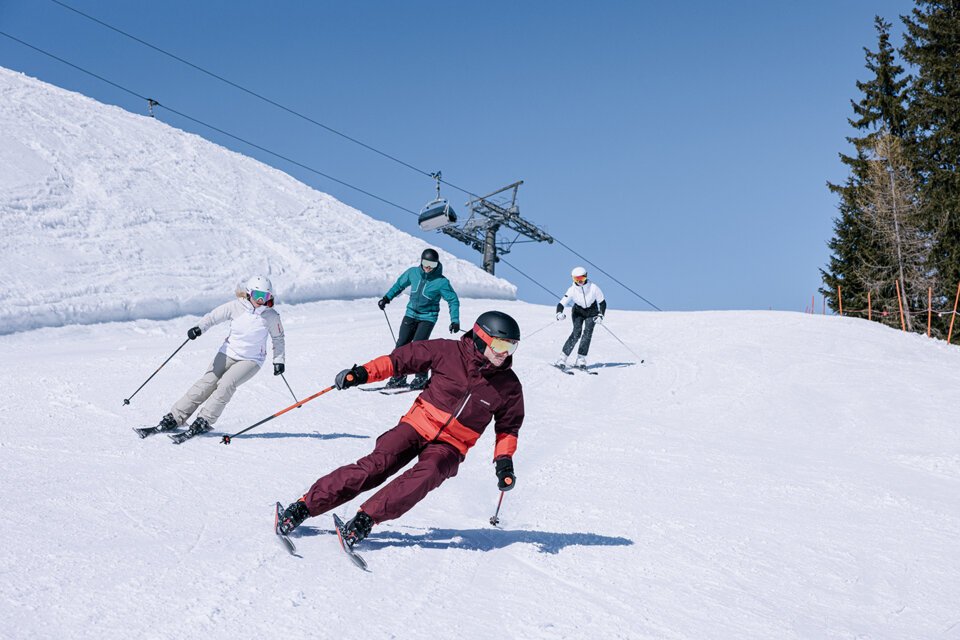
All-mountain ski for women and men
While all-mountain skis share the same fundamental characteristics across genders, some differences optimize the skiing experience. Men’s skis are typically longer and wider, providing greater stability at high speeds. Women’s all-mountain skis are often lighter, softer and shorter, allowing for better control and agility. Additionally, bindings on women’s skis are often mounted slightly forward.
At INTERSPORT Rent you can try the best all-mountain skis for men and women.
Your perfect companion for every adventure
Whether you enjoy smooth arcs on groomed slopes or are looking for the thrill of powder – all-mountain skis are designed to offer you the best on any terrain and in all snow conditions. Their special construction ensures that you're prepared for any environment, offering maximum freedom and flexibility to make each ski day an exciting adventure.
Invest in the right equipment and try the best all-mountain skis at INTERSPORT Rent. Let our RENTertainers guide you in finding the ski that fits you perfectly, enabling unforgettable moments on the slopes.
FAQs to all-mountain ski
Who are all-mountain skis suitable for?
All-mountain skis are ideal for skiers of all levels, from beginner to expert. They are especially suited for skiers who wish to remain flexible and explore various types of terrain.
What length should an all-mountain ski be?
The ideal length depends on the skier’s height, weight and skiing style. Generally, an all-mountain ski should reach somewhere between shoulder height and head height. Experienced skiers often choose longer models for more stability at higher speeds.
Which all-mountain ski is right for me?
Choosing the right ski depends primarily on your skill level and preferred terrain or style.
Selection based on skill level:
| Level | Ski characteristics |
| Beginners | Short and soft skis |
| Intermediate | A middle ground |
| Experts | Long and stiff skis |
Selection based on preferred terrain:
| Terrain | Ski characteristics |
| Groomed slopes | hard, narrow, long, heavy, with camber profile |
| Off-piste and powder | soft, wide, short, lightweight, with rocker profile |
Tip: For absolute beginners in skiing, we recommend Easy-Carver or Allround-Carver.
Can you carve with an all-mountain ski?
Yes, all-mountain skis are designed to perform well on groomed trails and allow for good edge control necessary for carving. They often have moderate sidecuts and a flexible center, making medium and short-radius turns easier. Special carvers, on the other hand, are perfectly tailored to this specific area of use and allow you to get the absolute maximum out of every carving descent.
What advantages does an all-mountain ski offer over an on-piste or freeride ski?
Unlike specialized on-piste or freeride skis, all-mountain skis combine the best of both worlds: They are stable and precise on groomed trails while offering float and flexibility in powder. This makes them ideal for those who don’t want to be limited to one type of terrain.
